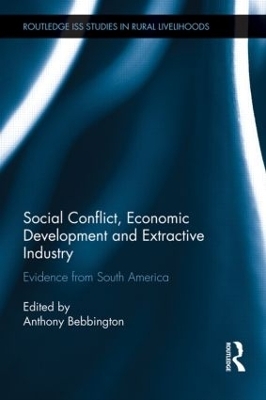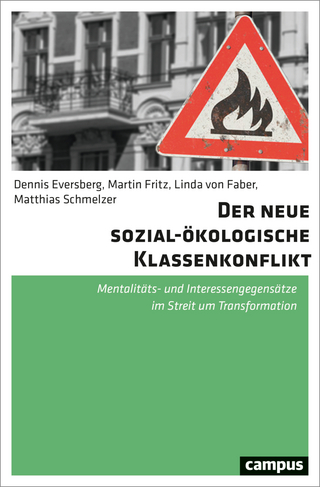
Social Conflict, Economic Development and the Extractive Industry
Routledge (Verlag)
978-0-415-62071-0 (ISBN)
The extraction of minerals, oil and gas has a long and ambiguous history in development processes – in North America, Europe, Latin America and Australasia. Extraction has yielded wealth, regional identities and in some cases capital for industrialization. In other cases its main heritages have been social conflict, environmental damage and underperforming national economies. As the extractive economy has entered another boom period over the last decade, not least in Latin America, the countries in which this boom is occurring are challenged to interpret this ambiguity. Will the extractive industry yield, for them, economic development, or will its main gifts be ones of conflict, degradation and unequal forms of growth.
This book speaks directly to this question and to the different ways in which Latin American countries are responding to the challenge of extractive industry. The contributors are a mixture of geographers, economists, political scientists, development experts and anthropologists, who all draw on sustained field work in the region. By digging deep into both national and local experiences with extractive industry they demonstrate the ways in which it transforms economies, societies, polities and environments. They pay particular attention to the social conflict that extraction consistently produces, and they ask how far this conflict might usher in political and institutional changes that could lead to a more productive relationship between extraction and development. They also ask whether the existence of left-of-centre governments in the region changes the relationships between extractive industry and development.
The book makes clear the immense difficulties that countries and regional societies face in harnessing extractive industry for the collective good. For the most part the findings question the wisdom of the development model that many countries in the region have taken up and which emphasises the productive roles of mining and hydrocarbon industries. The book should be of interest to students and researchers of Development Studies, Geography, Politics and Political Economy, as well as Anthropology.
Anthony Bebbington is Higgins Professor of Environment and Society and Director of the Graduate School of Geography at Clark University, USA. He is also a Professorial Research Fellow in the School of Environment and Development at the University of Manchester, UK, and Research Associate of the Centro Peruano de Estudios Sociales, Lima, Peru.
Part 1: Political Economies of Extraction 1. Extractive Industries, Socio-Environmental Conflicts and Political Economic Transformations in Andean America Anthony Bebbington 2. The Political Economy of Managing Extractives in Bolivia, Ecuador and Peru Jose Carlos Orihuela and Rosemary Thorp 3. The Politics of Extractive Industries in the Central Andes John Crabtree and Isabel Crabtree-Condor Part 2: Conflicts, Transformations and Institutional Change 4. Social Conflict and Emergent Institutions: Hypotheses from Piura, Peru Anthony Bebbington 5. Mining and Conflict in Peru: Sowing the Minerals, Reaping a Hail of Stones Javier Arellano-Yanguas 6. Sovereignty Negotiated: Anti-Mining Movements, the State and Multinational Mining Companies under ‘Correa's Twenty-First Century Socialism’ Jennifer Moore and Teresa VelÁsquez 7. State-Indigenous Tensions over Hydrocarbon Expansion in the Bolivian Chaco Denise Humphreys Bebbington 8. Planning Development Futures in the Ecuadorian Amazon: The Expanding Oil Frontier and the Yasuní-ITT Initiative Laura Rival 9. The Camisea Gas Project: Indigenous Social Movements and International NGOs in the Peruvian Amazon Brian Pratt 10. Household and Community Responses to Mining-Related River Contamination in the Upper Pilcomayo Basin, Bolivia David Preston Part 3: Conclusions and Comparisons 11. Afterward: Mining Conflict in Bolivia, Ecuador and Peru Stuart Kirsch 12. Conclusions Anthony Bebbington
| Reihe/Serie | Routledge ISS Studies in Rural Livelihoods |
|---|---|
| Zusatzinfo | 10 Tables, black and white; 6 Line drawings, black and white; 6 Illustrations, black and white |
| Verlagsort | London |
| Sprache | englisch |
| Maße | 156 x 234 mm |
| Gewicht | 680 g |
| Themenwelt | Sozialwissenschaften ► Soziologie ► Spezielle Soziologien |
| Technik ► Bergbau | |
| Wirtschaft | |
| ISBN-10 | 0-415-62071-6 / 0415620716 |
| ISBN-13 | 978-0-415-62071-0 / 9780415620710 |
| Zustand | Neuware |
| Informationen gemäß Produktsicherheitsverordnung (GPSR) | |
| Haben Sie eine Frage zum Produkt? |
aus dem Bereich


